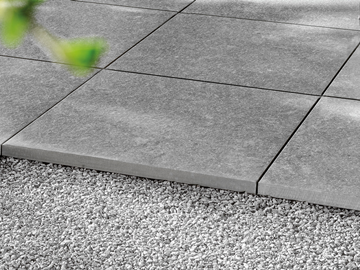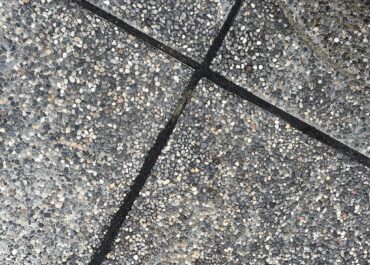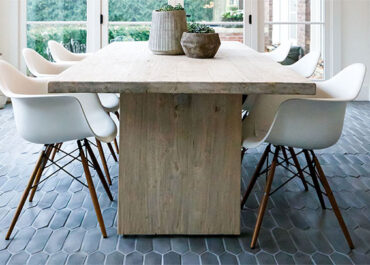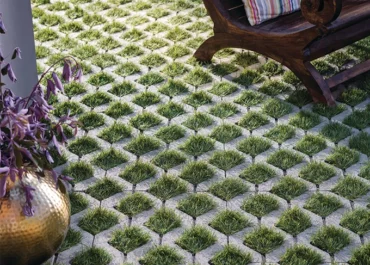
Porcelain pavers are the hottest new trend in the hardscape industry. With unmatched resistance and efficiency in maintenance costs, it has proven to be a top choice of material even for the most demanding homeowners. Porcelain pavers come in a lot of options of design and color. But how thick are porcelain pavers, and what are their applications?
The good news is: porcelain pavers serves a lot of different applications, both indoors or outdoors. The resistance of porcelain makes it a good material even for factory floors and vehicular traffic. On the other hand, its delicacy and pristine look make it an excellent choice for elegant interior design.
So what is this magic? How is porcelain so good and versatile? What is the recommended thickness for each possible application? That’s what we are aiming to answer in this article, so let’s get to it.
How Thick are Porcelain Pavers?
Porcelain pavers can be found in two categories of thickness: standard thickness and 2 cm thickness.
The standard thickness category includes any pavers that are between 8 mm and 10 mm thick.
These pavers are recommended for indoor use. The standard thickness pavers work best when protected from weather conditions and water. Also, for a vehicular traffic area, like a driveway or a garage, the standard thickness pavers can get damaged.
This damage happens not exactly because of the weight of the vehicles (again, porcelain pavers are very sturdy) but because of the shifting in place that can happen, especially in a dry installation.
That’s why, for outdoor use, it is recommended to use the 2 cm thickness category of pavers.
The 2 cm thickness pavers can hold themselves in place by their sheer weight. For that reason, they are an excellent choice for a dry installation, which is something you’ll usually want in an outdoor design.
The 2 cm pavers, again, due to their weight, don’t need adhesive during installation. As for the standard thickness pavers, some form of adhesion can be recommended in areas with high traffic.
Recommended Thickness for Each Application
Depending on what exactly you need for your installation, a certain thickness of paver is more recommended than the other. The following table presents some possibilities and recommendations of the proper thickness according to some characteristics of your installation.
| Standard Thickness (between 8 mm and 10 mm) | 2 cm | |
| Exposure to Weather Conditions | Not Recommended | Recommended |
| Minimal Thickness | Recommended | Not Recommended |
| Slip Resistance | Recommended | Recommended |
| Load Capability | Good Enough | Recommended |
| Installation on Pedestals | Not Recommended | Recommended |
| Installation on Sand | Not Recommended | Recommended |
| Installation on Gravel | Not Recommended | Recommended |
| Interior Installation on Slab (with adhesive) | Recommended | Good Enough |
| Exterior Installation on Slab (with adhesive) | Good Enough | Recommended |
| Price | Recommended | Good Enough |
| Large Options | Recommended | Recommended |
| Small Options | Recommended | Not Recommended |
| Aesthetic Options | Recommended | Good Enough |
What Makes Porcelain so Good?
If you have just discovered that porcelain pavers are an option, maybe some doubts are still on your mind. After all, when we think of porcelain the first thing that comes to mind are those old style porcelain wares, like plates, cups and bowls.
Well, that is a very common misconception.
That is indeed how porcelain started being used centuries ago in China. But throughout history, many cultures have developed technologies that improved the quality of porcelain to a point where it was even possible to be used in construction.
A modern examples of the use of porcelain in construction is the Dakin Building, located in Brisbane, California.

Nowadays, porcelain pavers are used in many applications and are considered to be a top choice due to their resistance and how easy they are to maintain.
Porcelain is a form of ceramic, but with a special kind of mineral on its structure: the mullite.
When heated to the high temperatures in which porcelain is made, between 2,200 and 2,600 °F, the mullite undergoes a process called vitrification, in which it, essentially, becomes a form of glass.
That’s what makes the porcelain such a high resistance without sacrificing the aesthetic appeal. To answer our own question, that’s how the magic happens.
Porcelain Paver Maintenance
It doesn’t matter how thick your porcelain pavers are, as long as you keep a good maintenance of them, they can last for years and years. And this maintenance really is simple. Some simple guidelines and practices will suffice.
- Porcelain is a non-porous material, so the use of waxes, oily soaps, impregnating products and repellent treatments is unnecessary.
- Swipe leaves and other biological material right away.
- Spills should also be cleaned right away. But be careful! They should always be soaked with a clean cloth, never wiped.
- For day to day cleaning, a simple mixture of bleach or ammonia in warm water will do the trick.
- If the worst happens, and you end up having a particularly hard stain to remove, you can follow this table to choose the right product for cleaning.
| Solvents (bleach, turpentine oil, acetone, trichloroethylene, nitrate based thinner) | Acids (muriatic acid, hydrochloric acid, phosphoric acid) | Alkali (alkaline based detergents) | |
| Beer | ✔ | ||
| Lime | ✔ | ||
| Tar | ✔ | ||
| Cement | ✔ | ||
| Candle Wax | ✔ | ||
| Glue | ✔ | ||
| Chewing Gum | ✔ | ✔ | |
| Rubber Tire, Shoes | ✔ | ||
| Grease, Oil | ✔ | ||
| Ink | ✔ | ||
| Nicotine | ✔ | ||
| Felt-Tip Pen | ✔ | ||
| Resins | ✔ | ||
| Rust | ✔ | ||
| Nail Polish | ✔ | ||
| Cigarette | ✔ | ||
| Wall Paint | ✔ | ✔ |
Buying Porcelain Pavers

Now that you know how thick are porcelain pavers, what are the advantages of using them and the proper way to maintain it, the only thing left in to get your own and add them to your hardscape or interior design project.
Being a growing trend, porcelain is easy to find on most contractors who work with pavers and natural stone. Look for a professional you can trust and start planning your next steps.
An in case you are around the Sarasota and Manatee Counties, in FL, why not give us here at Eagle Pavers a call?
For the last 14 years, we’ve been serving the area with only the best when it comes to paver supply. Our customers who have acquired porcelain pavers have never regretted it.
Reach us anytime through our number +1 941-210-4192 or email sales@eaglepavers.us. We’ll be happy to help you with any paver need you might have.




